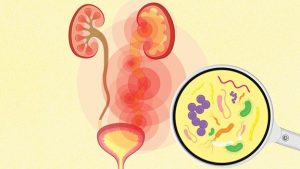Have you ever felt like your moods frequently changing, or that your emotions are out of control?
You’re not alone! Mental health issues are far too common in women, particularly regarding hormones.
In this blog, we’ll explore the different ways that hormones can affect your mental health and provide some tips on how to manage these issues.
Let’s dive into this important topic together!

What’s the Link Between Hormones & Mental Health in Women?
As a woman, you must already know that your hormones keep constantly fluctuating throughout your menstrual cycle. However, what you may not be aware of is how those fluctuations can affect your mental health.
Research has shown that changes in hormone levels can positively and negatively impact a woman’s mental well-being, with hormones playing a key role in many mental health conditions.
When it comes to the relationship between hormones and mental health in women, there are two major hormonal players: estrogen and progesterone.
Estrogen is known to have an antidepressant effect, while progesterone has been linked to mood swings and irritability.
During the times of hormonal imbalance—such as during menstruation, pregnancy, or menopause—women can experience an increased risk of developing depression. This is because the lack of normal levels of estrogen and progesterone can lead to an imbalance of neurotransmitters in the brain, which can lead to changes in energy levels, mood swings, and irritability.
Given the complex connection between hormones and our mental well-being, women need to be aware of their hormone levels and any potential signs that something might be off-balance.
How Does Estrogen Affect Mental Health?
When it comes to hormones and mental health, estrogen is a key player. Estrogen levels often impact women’s moods and behavior, as well as influence their overall well-being. Not only does estrogen affect mental health, but it can also affect physical health in terms of things like bone strength and heart health.
In general, an increase in estrogen leads to an increase in overall well-being of the body. It has been found to improve mood, reduce stress levels, and increase attention span and memory ability.
On the other hand, low levels of estrogen can be linked to symptoms such as depression, anxiety, irritability, and insomnia.
This means that it is important for women to monitor their estrogen levels. With proper hormone balance, women are better able to manage their mental health issues—and maintain a healthier emotional state overall.
What Role Does Cortisol Play in Mental Health?
You might have heard of cortisol – it’s a stress hormone that gets released in the body during moments of fear or perceived danger. In general, cortisol helps your body handle times of stress. But too much cortisol can lead to problems if it keeps being released over an extended period.
Studies have found that when women experience increased levels of stress, their bodies may react differently than men. For example, women may feel more overwhelmed and anxious due to their bodies’ reactions to stress hormones like cortisol. Some women may be more prone to depression or anxiety due to higher levels of cortisol in their bodies.
Additionally, research has shown that large fluctuations in hormone levels (such as during menstruation or menopause) can trigger changes in mental health for some women. This can lead to increased feelings of depression and anxiety – feelings that may be exacerbated by long-term exposure to high levels of cortisol.
To help manage the effects that hormones may have on mental health, women need to practice self-care techniques such as taking time out for relaxation exercises and getting enough sleep each night. It is also important for women to engage in mindful activities such as yoga or meditation, as well as seek professional help if needed.
What Causes Hormone Imbalances?
Hormone imbalances can occur due to a variety of factors. However, understanding the potential causes of hormone imbalances can help individuals take the neccessary steps to prevent or manage hormonal imbalances and promote overall health and well-being.
Here are some major causes of hormone imbalance:
- Stress
Stress is one of the primary causes of hormone imbalances — when your body is on high alert, it releases hormones that raise cortisol levels. This can throw off the balance of important hormones like estrogen and testosterone. In addition to this, stress can also affect your melatonin levels which can disrupt sleep patterns and lead to fatigue and further imbalance.
- Diet & Exercise
Your diet and exercise regimen can also play a role in hormone imbalances. Eating too little or too much, as well as not getting enough exercise, can contribute to an imbalance in your hormones — including those responsible for regulating hunger and emotions such as serotonin.
Making sure you’re eating a balanced diet with plenty of fruits and vegetables, staying hydrated, exercising regularly, as well as getting enough sleep are all key components to ensuring the proper balance of hormones in your body.
Symptoms of Hormone-Related Mood Disorders
When it comes to hormones and mental health in women, it’s important to be aware of the symptoms of hormone-related mood disorders. Some of the most common signs and symptoms include:
- Feeling overwhelmed
If you’re feeling overwhelmed most of the time, including feeling out of control or unable to cope with stress, it could be a sign that your hormones are out of balance.
- Anxiety
Anxiety is a normal stress response, but if you are feeling excessively anxious for extended periods this could be a sign that something isn’t quite right. Especially if you can’t seem to pinpoint the cause of why you’re feeling this way.
- Insomnia
Women who experience changes in their estrogen and progesterone levels during their menstrual cycle often also experience restlessness, difficulty falling asleep or staying asleep, or fatigue.
- Inability to concentrate
Women affected by hormonal imbalances may struggle with functioning on a day-to-day basis because they can’t concentrate or finish tasks due to fatigue and brain fog.
- Mood swings
If your moods are changing rapidly and unpredictably — such as going from happy one minute to crying the next — this could be caused by hormones being out of balance.
No matter what symptoms you’ve been experiencing, if you suspect that hormone imbalances could be affecting your mental state it’s important to speak with your doctor as soon as possible. They can help you find the right treatment plan for your specific needs and help get your hormones back into balance so that you can feel better again.
Treatment Options for Hormone-Related Mental Health Disorders
It is important to note that hormones play an essential role in your mental health, especially if you are a woman. Fortunately, there are many treatment options available to help women manage hormone-related mental health disorders.
- Hormone Replacement Therapy (HRT)
Hormone replacement therapy (HRT) is the most common treatment option for many hormonal concerns and can be used to treat anxiety, depression, and other mental health disorders caused by changes in hormone levels. HRT involves taking medications or supplements that replace the hormones your body is no longer producing naturally. This can help restore balance and reduce some of the symptoms you may be experiencing.
- Diet and Exercise
Making changes to your diet and exercise routine can also have a positive impact on your mental health. Eating a balanced diet with whole grains, fruits, vegetables, and lean proteins can provide your body with essential nutrients for optimal hormonal functioning. Additionally, engaging in regular physical activity can cause the release of endorphins which can help improve mood and focus.
- Stress Management
The ability to cope with stress is also highly important in managing hormone-related mental health issues. Developing skills like mindfulness meditation and deep breathing techniques can help you stay calm during difficult times and give your body a chance to heal itself naturally. Additionally, talking to friends or family members about how you are feeling can also be beneficial in managing stress levels.
Hence, understanding how hormones and mental health are connected is essential for women’s health. We must become aware of all the elements at play, to address the root causes of any issues and to improve our overall mental health.
It’s time to embrace womanhood in all its entirety without any shame, fears, or doubts!







